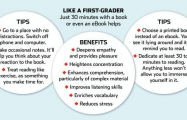It improves ability to concentrate, reduces stress levels and deepens ability to think, listen and empathize. The movement echoes a resurgence in other old-fashioned, time-consuming pursuits that offset the ever-faster pace of life, such as cooking the "slow-food" way or knitting by hand.
The benefits of reading from an early age through late adulthood have been documented by researchers. A study of 300 elderly people published by the journal Neurology last year showed that regular engagement in mentally challenging activities, including reading, slowed rates of memory loss in participants` later years.
A study published last year in Science showed that reading literary fiction helps people understand others` mental states and beliefs, a crucial skill in building relationships. A piece of research published in Developmental Psychology in 1997 showed first-grade reading ability was closely linked to 11th grade academic achievements.
Screens have changed our reading patterns from the linear, left-to-right sequence of years past to a wild skimming and skipping pattern as we hunt for important words and information.
One 2006 study of the eye movements of 232 people looking at Web pages found they read in an "F" pattern, scanning all the way across the top line of text but only halfway across the next few lines, eventually sliding their eyes down the left side of the page in a vertical movement toward the bottom.
None of this is good for our ability to comprehend deeply, scientists say. Reading text punctuated with links leads to weaker comprehension than reading plain text, several studies have shown. A 2007 study involving 100 people found that a multimedia presentation mixing words, sounds and moving pictures resulted in lower comprehension than reading plain text did.
Slow reading means a return to a continuous, linear pattern, in a quiet environment free of distractions. Advocates recommend setting aside at least 30 to 45 minutes in a comfortable chair far from cellphones and computers. Some suggest scheduling time like an exercise session. Many recommend taking occasional notes to deepen engagement with the text.
Some hard-core proponents say printed books are best, in part because they`re more visible around the house and serve as a reminder to read. But most slow readers say e-readers and tablets are just fine, particularly if they`re disconnected from the Internet.
Photo
More about:

















































